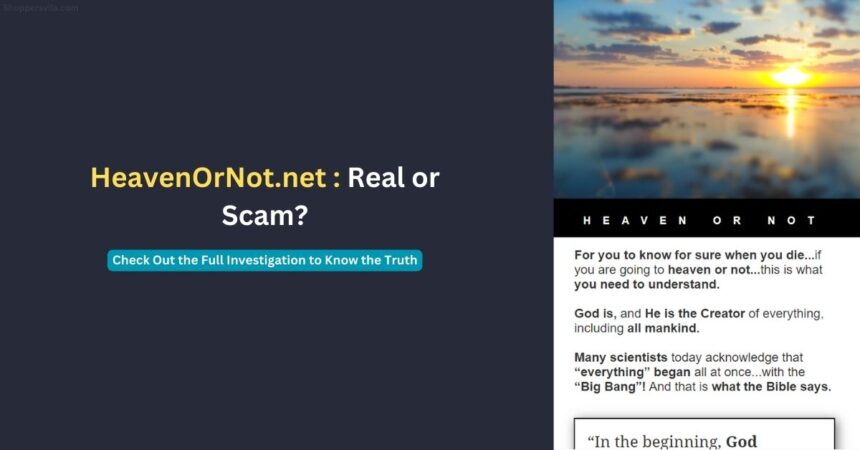A provocative new website called Heavenornot.net has been stirring up debate across social media and raising skepticism among many who’ve seen its dramatic TV commercials. But does this digital platform genuinely help people find salvation – or is it more interested in conversions and cash? Let’s dig deeper to reveal the facts behind this controversial religious startup.
At first glance, Heaven Or Not.net seems like a clever digital solution to an age-old question – where will I spend eternity after death? Its taglines promise you can “know for sure” whether heaven or hell awaits. Just enter your contact info, pray a prescribed prayer, and – congratulations! – your afterlife destination is set.
But many aren’t buying the simplistic sales pitch. “Another cult…sounds like a scam,” writes one Facebook commenter. Critics see the website as peddling fear to drive conversions to fringe theological beliefs. However, defenders argue it spreads truth and hope found only in Christ.
So what’s really behind this mysterious online ministry? Is it bringing light to lost souls or targeting vulnerable people through deceptive claims? Let’s analyze key details to uncover the full story.
Overview of the Heavenornot.net Platform
HeavenOrNot.net features a homepage with biblical verses and explanations about sin, salvation through Christ, and the afterlife. Those willing to “pray the prayer” can enter their contact info to connect with religious mentors. The site copyrights to GodLife.com, run by Oklahoma-based evangelical nonprofit Global Media Outreach.
Slick TV ads provocatively ask, “When you die, are you going to heaven or not? You can know for sure.” This ubiquitous campaign blankets daytime talk shows and late-night cable, raising awareness but also skepticism. Critics blast the platform’s absoluteness about admitting people to heaven simply for reciting a prayer.
How Does Heaven or Not Work?
The website presents evangelical theology on atonement through Christ as the sole path to heaven. Users read verses asserting human sinfulness, Jesus paying the penalty for sins, and salvation coming only by God’s grace through faith. At the end, they can click to “pray the prayer” and submit their contact info for follow-up mentorship.
Critics argue this oversimplifies complex spiritual questions on the afterlife. They also object to gathering user data for further ministry efforts. However, supporters contend it’s a legitimate outreach bringing the hope of Christ to a broken world.
I did, it said ‘not’. Another cult…sounds like a scam.
An user’s Facebook comment
User Reviews and Complaints
Across social platforms, public opinion on HeavenOrNot.net ranges from curious to contemptuous. While some appreciate its evangelistic mission, most express wariness or outright hostility toward its methods.
“Today’s winner for ‘Sounds Like a Scam.’ I’m sure for the right amount of money, they will answer all my questions,” writes Anna Molly, echoing the prevalent belief it’s a profit-driven scheme, not genuine ministry. Others, like David Johnson, satirically mock the concept of a heavenly checklist.
Christian critics also blast its narrow theology centered on reciting a specific prayer, rather than lifelong faith and grace. Overall, skepticism and accusations of “clickbait” reign, indicating the attempt to inspire conversions through the platform has largely failed.
Is HeavenOrNot.net Offer Real Salvation or a Religious Scam?
Given the sweeping promises and opaque origins, it’s reasonable to ask whether HeavenOrNot.net operates in good faith or if it’s masquerading religion to exploit people’s hopes and fears. Let’s weigh both perspectives.
On one hand, the site ties to an established evangelical nonprofit known for outreach efforts. Form submissions call for mentoring, not money, and the prayer experience is free. This lends credibility to its desire to spread Christian salvation.
However, certain red flags stir distrust. The emotionally manipulative ads resemble clickbait, designed to provoke anxiety that drives conversions, not true spiritual reflection. And why the secrecy around its owners? Critics argue it’s to avoid scrutiny of profits over prophets.
Ultimately, individual discernment is needed. For Christians, its narrow theology may trouble, but the core salvation message aligns. For nonbelievers, its premises may seem unfounded. In both cases, transparency could help address doubts about exploitation.
How to Find “Will I Go to Heaven or Hell?”
Beyond one website’s claims, researching reputable spiritual sources can help discover answers about the afterlife. Some guidance:
- Seek wisdom from credible leaders in faiths you’re exploring, not just digital pop-ups.
- Examine your own conscience and intuitions. What moral truths resonate?
- Weigh spiritual teachings in light of their wisdom and fruits, not just emotional appeals.
- Recognize life’s mysteries. No quick fix can resolve our deepest questions. Seeking is the path to truth.
- Discuss with wise companions. Many perspectives give insight. Listen and share.
HeavenOrNot.net follows a long tradition of provocative evangelism. While its social reach is new, time-tested spiritual wisdom remains vital.
5 Tips to Stay Safe from Fake Online Religious Sites
Since anyone can create a professional-looking website, how can you spot digital frauds? Here are tips to avoid being manipulated:
- Research who’s behind it. Look up registrations and people involved. Beware anonymity.
- Follow the money. How are they profiting? Nonprofits are typically more credible than for-profits.
- Check their claims and evidence. Do teachings align with facts and other credible sources?
- Watch for pressure tactics. Red flags include emotional manipulation, quick fixes, absolute claims.
- Consult others. Ask mentors and search reputable sites on the group’s reputation. Bad news often surfaces.
Frequently Asked Questions About HeavenOrNot.net
1. Is Heaven Or Not associated with any particular religion?
It presents evangelical Protestant Christian beliefs on salvation through faith in Christ.
2. Can I 100% know whether I’m going to heaven or hell by using it?
No – that oversimplifies complex spiritual questions. Use discernment on its absolutist claims.
3. How does heavenornot.net earn revenue – is it a scam?
It’s tied to a nonprofit, but gathers user data for further ministry which helps fundraising.
4. Is their theology on salvation through Christ alone biblically sound?
There is debate within Christianity. Compare its claims to other denominations’ teachings.
5. Should I avoid this site and others making big promises about heaven?
Approach with skepticism, but they can provide initial guidance to later explore more deeply elsewhere.
The Bottom Line: Reflect Carefully Before Buying the Hype
HeavenOrNot.net joins a long line of evangelistic outreaches using sensationalist marketing to attract potential converts. While its affiliation with an established ministry lends some credibility, its hard sell tactics raise questions.
Before accepting dramatic claims about knowing your afterlife fate, consult spiritual mentors, ethical teachings, and your own conscience. Divine mysteries rarely resolve so easily. With life’s biggest questions, beware absolute answers promising certainty. The path to truth requires humble seeking, not just clicking.
At best, Heaven Or Not aims to stir sincere searching that leads people to salvation in Christ. At worst, it emotionally manipulates vulnerable people through deceptive certainty. The real truth likely lies between. Weigh its message thoughtfully, take what insight resonates, but don’t hand over your spiritual search to one website’s sweeping guarantees.
When it comes to eternal destinies, easy answers and money-making motives should give pause. Don’t let sensational marketing override your discernment. If exposed to HeavenOrNot.net’s claims, let them be a beginning, not an end. Keep seeking with an open mind the biblical wisdom that transcends any single source.




































Jesus is the only way to heaven. Believe no man or other words. We each have a free will to choose who or what we believe. I personally think the site is afraid of the word ” hell “. Call it what it is.